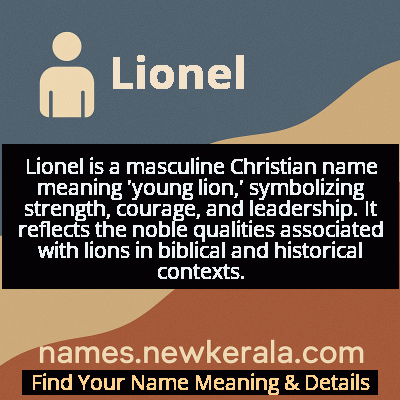Lionel Name Meaning & Details
Origin, Popularity, Numerology Analysis & Name Meaning of Lionel
Discover the origin, meaning, and cultural significance of the name LIONEL. Delve into its historical roots and explore the lasting impact it has had on communities and traditions.
Name
Lionel
Gender
Male
Origin
Christian
Lucky Number
4
Meaning of the Name - Lionel
Lionel is a masculine Christian name meaning 'young lion,' symbolizing strength, courage, and leadership. It reflects the noble qualities associated with lions in biblical and historical contexts.
Lionel - Complete Numerology Analysis
Your Numerology Number
Based on Pythagorean Numerology System
Ruling Planet
Uranus (Rahu)
Positive Nature
Strong sense of order, loyal, practical, and disciplined.
Negative Traits
Stubborn, overly serious, rigid, and prone to feeling restricted.
Lucky Colours
Blue, gray.
Lucky Days
Saturday.
Lucky Stones
Blue sapphire.
Harmony Numbers
1, 7, 8.
Best Suited Professions
Managers, engineers, accountants, organizers.
What People Like About You
Dependability, discipline, practicality.
Famous People Named Lionel
Lionel Messi
Professional Footballer
Considered one of the greatest football players of all time with multiple Ballon d'Or awards
Lionel Richie
Singer-Songwriter
Grammy-winning artist known for hits like 'Hello' and 'All Night Long'
Lionel Barrymore
Actor
Academy Award winner for A Free Soul and member of the prominent Barrymore acting family
Lionel Hampton
Jazz Musician
Revolutionized jazz vibraphone playing and led one of the most popular big bands
Name Variations & International Equivalents
Click on blue names to explore their detailed meanings. Gray names with will be available soon.
Cultural & Historical Significance
Extended Personality Analysis
People named Lionel are typically associated with strong leadership qualities and a commanding presence that naturally draws respect. They often exhibit the courage and protective instincts suggested by their lion namesake, showing bravery in confronting challenges and defending those they care about. Lionels tend to be ambitious and determined, pursuing their goals with focused intensity while maintaining a sense of fairness and justice. Their personality often combines strength with compassion, making them effective leaders who inspire loyalty in others. They typically possess excellent communication skills and charismatic appeal, enabling them to influence and motivate people around them. While they can be dominant and assertive when necessary, Lionels usually balance this with emotional intelligence and genuine concern for others' wellbeing. This combination of strength and sensitivity makes them particularly effective in roles requiring both authority and empathy, from business leadership to community organizing and creative pursuits.
Modern Usage & Popularity
In contemporary naming practices, Lionel maintains a position as a distinguished classic that conveys strength and tradition without being overly common. The name experienced significant popularity in the early 20th century, particularly in English-speaking countries, and saw a resurgence in the 1980s influenced by singer Lionel Richie's fame. Currently, it ranks consistently outside the top 100 names in the United States and United Kingdom but remains a respected choice for parents seeking a strong, traditional name with noble connotations. The global fame of footballer Lionel Messi has given the name renewed international appeal and cross-cultural recognition, particularly in Hispanic communities where it serves as a bridge between English and Spanish naming traditions. Modern parents often choose Lionel for its combination of classic elegance, strong masculine imagery, and the positive associations with successful contemporary figures, ensuring its continued relevance in an era that values both tradition and individual achievement.
Symbolic & Spiritual Meanings
Symbolically, Lionel represents the quintessential qualities associated with lions across cultures: courage, strength, leadership, and nobility. The 'young lion' aspect specifically symbolizes potential, growth, and the development of these qualities over time, suggesting someone destined for leadership who grows into their power. In Christian symbolism, the name connects to the Lion of Judah, representing Christ's kingly authority, resurrection power, and protective nature. Metaphorically, Lionel signifies moral courage—the strength to stand for principles and protect the vulnerable. The name also carries connotations of family loyalty and community protection, reflecting the lion's role as protector of the pride. Additionally, it symbolizes the balance between power and responsibility, suggesting that true strength involves using one's abilities for the benefit of others rather than mere dominance. This rich symbolic tapestry makes Lionel a name that conveys both personal strength and ethical leadership.

